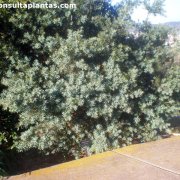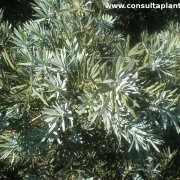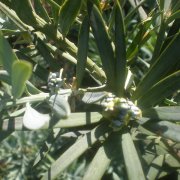Care of the tree Podocarpus elongatus or Breede River Yellowwood |
|
The genus Podocarpus, family Podocarpaceae, comprises 100 species of trees and shrubs native to Asia, the Pacific, Central and South America, New Zealand, Australia and Africa. Some species are: Podocarpus elongatus, Podocarpus macrophyllus, Podocarpus dispermus, Podocarpus henkelii, Podocarpus glaucus, Podocarpus grayae, Podocarpus latifolius, Podocarpus neriifolius. Common name: Breede River Yellowwood. This species is native to southern Africa. They are dioecious trees or shrubs of rounded bearing that reach 6 meters (19.68 feet) in height. The interesting foliage is formed by narrow leathery leaves of oblong-elliptical shape (6 cm/2.36" long) and greenish-blue or silver color. The female cones are decorative when fruiting because they turn reddish and are also edible. This slow-growing plants is used as isolated specimens in small to medium-sized gardens, in pots and planters, to form barriers and screens, or in small groups. Podocarpus elongatus can grow in full sun or light shade exposure. It resists occasional frosts but it's better not to expose it to less than 5 ºC (41 ºF). The soil must drain well and contain organic matter; use a garden substrate with coarse sand and compost. Breede River Yellowwood is rarely transplanted due to its slow growth. It has a good resistance to drought; Podocarpus elongatus appreciates regular waterings in spring and summer, always waiting for the substrate to have dried. Prune lightly in late winter to keep it compact. Fertilize with compost or manure in the fall or late winter. Breede River Yellowwood is a resistant plant to the usual pests and diseases. Podocarpus elongatus is propagated from seeds sown in autumn in a seedbed with a slightly damp substrate and in semi-shade. |
Images of the tree Podocarpus elongatus or Breede River Yellowwood |
Find plants
Podocarpus elongatus or Breede River Yellowwood | Care and Growing
© 2025 FavThemes


